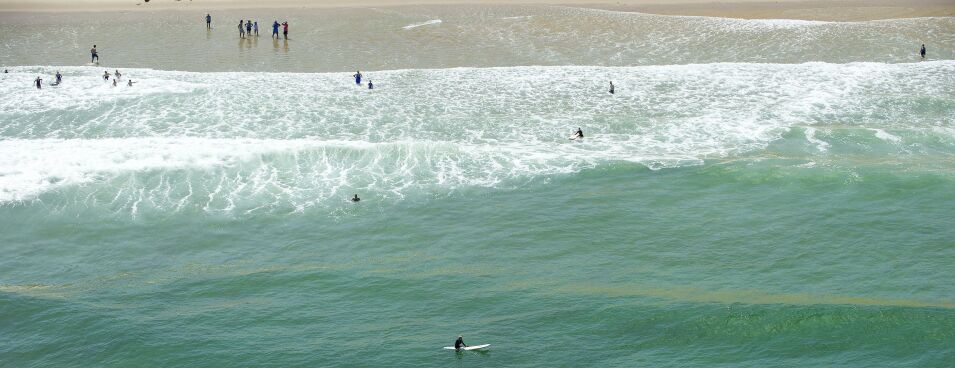
The EPA’s determination that it “categorically” can’t regulate pollution-via-groundwater under the Clean Water Act is entitled to deference despite “opening a gaping regulatory loophole,” the U.S. District Court for the District of Massachusetts said Nov. 26.
The decision comes after the Supreme Court heard arguments over the same question in County of Maui v. Hawai’i Wildlife Fund on Nov. 6.
At issue in the Massachusetts case is a wastewater treatment facility at the Wychmere Beach Club on Cape Cod, where treated wastewater seeps through the groundwater into Wychmere Harbor. The Massachusetts Department of Environmental Protection found that the discharges were partially responsible for excessive nitrogen in the harbor.
The nonprofit Conservation Law Foundation filed two lawsuits, one under the Clean Water Act and one under the Resource Conservation and Recovery Act. The district court on Nov. 26 allowed the group’s RCRA case to move forward but rejected its Clean Water Act arguments, citing a recent federal policy change.
The Environmental Protection Agency in April that the Clean Water Act’s permitting program doesn’t apply to pollution that moves through groundwater before reaching a federally regulated surface water, like a lake, river, or the ocean. The announcement, put forth in an “interpretive statement,” marked a change from the agency’s previous position that permits are required for pollution into groundwater that is “hydrologically connected” to a surface water.
Inside the Decision
Judge William G. Young said the agency’s new interpretation of the law is permissible, and deserves deference.
Although “at first blush” the statute’s language appears to cover pollution-via-groundwater, the court said the law’s structure and history indicate that it was meant to leave groundwater regulation to the states. In addition, Young wrote, a “literal reading” would allow the law to “spiral off into absurdities,” like punishing homeowners who use septic systems.
“The Court doubts that Congress wished to menace these millions of homeowners with stiff penalties, let alone criminal prosecution, for flushing their toilets without a federal permit,” Young said.
The EPA’s interpretation was permissible even though it “seemingly frustrates the policy that Congress sought to implement.” Its bright-line rule addresses “the need for clarity on the scope” of the law, and ruling that groundwater is covered “might place unreasonable regulatory compliance burdens upon millions of citizens,” the court said.
“The court admits to a degree of puzzlement at the wisdom of EPA’s ‘categorical rule,’” but “drawing the line is a matter firmly within the EPA’s expertise,” it said.
Mark Ryan, a water attorney with the Washington state-based firm Ryan & Kuehler PLLC, said the opinion appears to be the first court decision based on the EPA’s new interpretation.
He noted, however, that the Supreme Court’s eventual resolution of the Maui case could eliminate the EPA interpretation the district court applied.
“I’m surprised he didn’t sit on it for at least a few more months because the Supreme Court will be ruling in the spring,” Ryan said.
RCRA Claims
Young, an appointee of President Ronald Reagan, issued an order in a related case Nov. 26 allowing the Conservation Law Foundation to move forward on claims that the beach club’s wastewater discharges violate RCRA, the federal law that regulates waste management.
Christopher Kilian, vice president for strategic litigation for the group, said he was disappointed the court scrapped the Clean Water Act arguments but pleased to instead move ahead on the RCRA case. The group had encouraged the Massachusetts court to review the RCRA claims as a potential alternative to the Clean Water Act claims.
Critics of environmental groups’ position in the Maui case at the Supreme Court have long argued that pollution that moves through groundwater is adequately regulated RCRA, the federal Safe Drinking Water Act, and state regulations.
The foundation represented itself. Mintz, Levin, Cohn, Ferris, Glovsky & Popeo PC represented the club.
The Clean Water Act case is Conservation Law Found. v. Longwood Venues & Destinations Inc., D. Mass., No. 1:18-cv-11821, 11/26/19. The RCRA case is Conservation Law Found. v. Longwood Venues & Destinations, D. Mass., No. 1:19-cv-11672, 11/26/19.
"water" - Google News
November 27, 2019 at 05:26AM
https://ift.tt/2QXDcTI
EPA Clean Water Act Interpretation Reasonable, Court Says (1) - Bloomberg Environment
"water" - Google News
https://ift.tt/2XpCTT3
Shoes Man Tutorial
Pos News Update
Meme Update
Korean Entertainment News
Japan News Update
Bagikan Berita Ini














0 Response to "EPA Clean Water Act Interpretation Reasonable, Court Says (1) - Bloomberg Environment"
Post a Comment